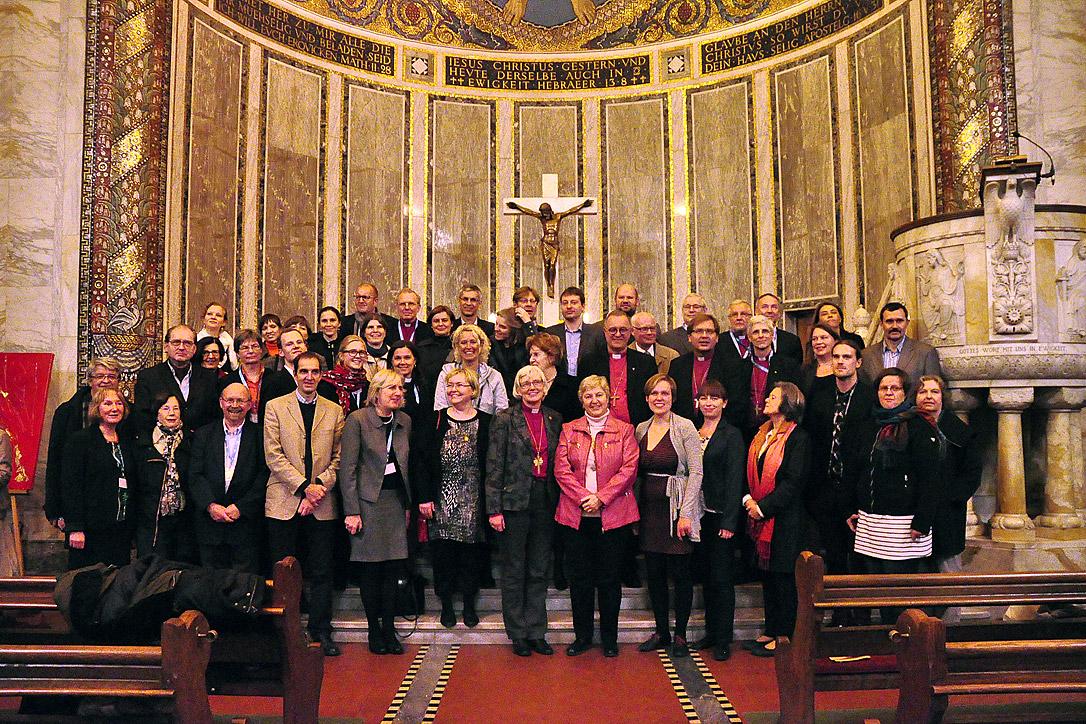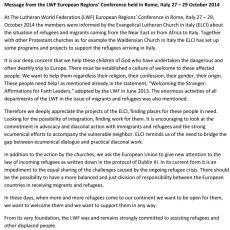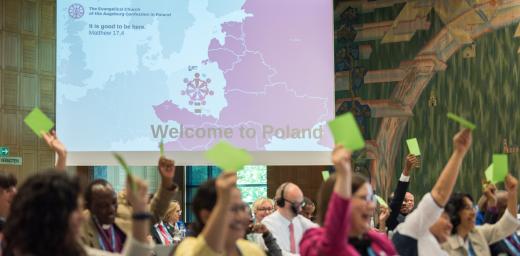Impulses from New Media in European Lutheran Churches, But for Some, War Is a Reality

Participants in the LWF European Regionsâ Conference in Rome, Italy. Photo: Gerhard Frey-Reininghaus
LWF Vice-Presidents Reflect on Hopes and Challenges in Church and Society
(LWI) - “Listening, Serving, Empowering-Being Church in a Transforming Europe,” was the theme of The Lutheran World Federation (LWF) European Regions’ Conference, 27-29 October in Rome, Italy.
The three Vice-Presidents of the LWF European region shared their reflections on some of the challenges facing Christian and Lutheran witness in their respective contexts, and the new impulses that could help churches to build relationships that empower them to serve in their communities.
Fear of War Is Real
Central Eastern Europe: Hungarian Bishop Dr Támas Fabiny from the Central Eastern Europe region, of which he is LWF Vice-President, highlighted the tragic results of the conflict situation in the Ukraine. The LWF Council adviser Ms Anastasiya Piddubska had talked about the impact of the armed conflict on the population, saying it is resulting in internal emigration and traumatization even among the health and social service providers.
“The neighboring countries are afraid of the escalation of war. Indeed in the Baltic countries, the fear of war is real among the populations. People approach the church asking what to do, how to respond in case of war. And, unfortunately, the atmosphere of suspicion is rising between ethnic groups of these countries,” Fabiny noted.
Other concerns in the region include the challenge of the negative demographic tendencies and emigration. “Hundreds of thousands from our population go to the Western countries to work and to live there. And those leaving are basically the young educated intellectual layer of our societies like doctors or computer experts,” said Fabiny, who is bishop of the Northern Diocese of the Evangelical Lutheran Church in Hungary.
There is also internal migration as younger people move to bigger cities to find work. “Thus villages, smaller towns, and therefore also our congregations in the countryside are emptying out,” he noted.
In Hungary, the new state requirement that ethics or optional religion is taught at elementary schools poses a special challenge for the Lutheran church as its pastors and religion teachers have to cover the whole country and provide numerous religion classes. “We have to find a way of coping with this challenge. While we would like to take the opportunity, we also would not like to weaken the congregational work,” he said.
Fabiny added that the participants from Central Eastern Europe region had each named a concrete issue the others should pray for. “We hope that a network of prayer will strengthen the spiritual strength of the Lutherans in the region, and that other churches in the continent will show more sensitivity toward our special situation. This is especially needed for the region due to the crisis in Ukraine.”
A World with Broken Traditions
Central Western Europe: Bishop Dr Frank O. July, LWF Vice-President for Central Western Europe said he appreciated the increasing using of new media, and wondered how these could be used to help enhance relationships not only between Christians but also between and among people of different faiths.
“Some of the challenges facing Christian and Lutheran witness today is that we live in a world with broken traditions. This also means that we are no longer able to transfer and submit faith contents automatically,” said July, bishop of the Evangelical Lutheran Church in Württemberg, Germany.
“From our conversations, I learned that young people are able to use the new media and social networks much better than me. And I think it is necessary and important for the church to go deep inside in that new space of new media,” July noted.
Still, new media “can never replace face to face communication, which becomes ever more important. We have to be near the people. And we have to be oriented at what we are doing and actively promoting. So I think it is very important to support our Italian sisters and brothers in the issue of migration and refugees arriving at the coast of Italy,” he added.
Solidarity with the Poorest Neighbor
Nordic Countries: Presiding Bishop Helga Haugland Byfuglien, LWF Vice-President for the Nordic region said the “very serious challenges” that Christians and churches face today include the huge numbers of refugees particularly in southern Europe and climate change. Both issues “increasingly threaten our future and also call for “solidarity with the poorest neighbor in the world.”
Byfuglien, from the Church of Norway, said the conversations in the group sessions explored possibilities for the churches “to get better” at using social media and improve their connections to people in the local contexts. “We need to be an ever more listening and guesting community, both locally and on a broader level. We need to communicate better and be more relevant in the society and with the different groups of people to whom we relate,” she stressed.
Byfuglien described as “very promising” the enthusiasm of the young people linked together in the LWF Global Young Reformers Network. “This is good and necessary for the communion today and in the future,” she added.
The Evangelical Lutheran Church in Italy hosted this year’s meeting, attended by 55 participants from 30 LWF member churches.






